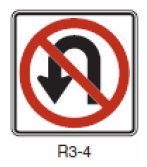No U-Turn Sign Design Guidelines: Difference between revisions
Bruce Wacker (talk | contribs) |
Bruce Wacker (talk | contribs) |
||
| Line 12: | Line 12: | ||
A field investigation is required to determine if a “No U-Turn” sign is to be installed. The reviewer should observe whether the street has a median or not and if so, determine if there is a dedicated left turn bay. If at a signalized intersection, the reviewer should determine if a right turn overlap from the minor street exists with the left turn phase from the major street that could cause a conflict if U-turns were permitted. | A field investigation is required to determine if a “No U-Turn” sign is to be installed. The reviewer should observe whether the street has a median or not and if so, determine if there is a dedicated left turn bay. If at a signalized intersection, the reviewer should determine if a right turn overlap from the minor street exists with the left turn phase from the major street that could cause a conflict if U-turns were permitted. | ||
===At intersections Without a Left Turn Bay:=== | |||
If there is not a dedicated left turn lane from which to negotiate the U-turn, the “No U-Turn” sign should be installed. The intent is to reduce the blockage of a through lane of traffic by the U-turning vehicle while waiting for a gap in the opposing traffic stream and to minimize the potential for rear-end collisions by vehicles slowing to make this maneuver. | If there is not a dedicated left turn lane from which to negotiate the U-turn, the “No U-Turn” sign should be installed. The intent is to reduce the blockage of a through lane of traffic by the U-turning vehicle while waiting for a gap in the opposing traffic stream and to minimize the potential for rear-end collisions by vehicles slowing to make this maneuver. | ||
===At Signalized Intersections With Right Turn Overlap Phases:=== | |||
If there is a right turn overlap phase from the cross street occurring with a protected left turn movement that causes a vehicle conflict, the “No U-Turn” sign should be installed. | If there is a right turn overlap phase from the cross street occurring with a protected left turn movement that causes a vehicle conflict, the “No U-Turn” sign should be installed. | ||
Revision as of 15:40, 30 July 2014
City Guidelines Regarding the Installation of “No U-Turn” Signs
Traffic Services Division of the Department of Public Works
Governing Document Reference:
Manual on Uniform Traffic Control Devices for Streets and Highways (MUTCD), 2009 or latest edition and the Overland Park Municipal Code 12.04.
MUTCD Requirements:
“No U-Turn” (R3-4) signs are intended for use at or between intersections to indicate locations where U-turns are prohibited. If “No U-Turn” (R3-4) signs are used, at least one should be placed over the roadway, at the far left-hand corner of the intersection, on a median, or in conjunction with the “Stop” sign or “Yield” sign located on the near right-hand corner. If signals are present the “No U-Turn” sign should be installed adjacent to a signal face viewed by road users in the left lane.

City of Overland Park Guidelines for Installation:
A field investigation is required to determine if a “No U-Turn” sign is to be installed. The reviewer should observe whether the street has a median or not and if so, determine if there is a dedicated left turn bay. If at a signalized intersection, the reviewer should determine if a right turn overlap from the minor street exists with the left turn phase from the major street that could cause a conflict if U-turns were permitted.
At intersections Without a Left Turn Bay:
If there is not a dedicated left turn lane from which to negotiate the U-turn, the “No U-Turn” sign should be installed. The intent is to reduce the blockage of a through lane of traffic by the U-turning vehicle while waiting for a gap in the opposing traffic stream and to minimize the potential for rear-end collisions by vehicles slowing to make this maneuver.
At Signalized Intersections With Right Turn Overlap Phases:
If there is a right turn overlap phase from the cross street occurring with a protected left turn movement that causes a vehicle conflict, the “No U-Turn” sign should be installed.
At signalized intersections, The “No U-Turn” sign should be mounted on the signal pole adjacent to the left turn signal indication. In the case of dual left turn lanes, the “No U-Turn” sign should be installed on the mast arm between the two left turn signal heads. At unsignalized intersections, the sign should be installed in the median nose opposite the intersection, (or along the curb line in the case of a non-divided street), in a conspicuous location for full driver visibility.
The reviewer should also attempt to determine if any access agreement with property owners has been previously made which would provide exception with the above requirements.
Signing Standards:
The “No U-Turn” (R3-4) sign shall have a black legend and border on a reflectorized white background with a red “NO” symbol. The “No U-Turn” (R3-4) sign shall be 24”x24” on conventional roadways with single lane approaches or on multi-lane conventional roadways with speeds less than or equal to 35 mph. On multi-lane conventional roadways with speeds greater than 35 mph, the sign shall be 36”x36”.